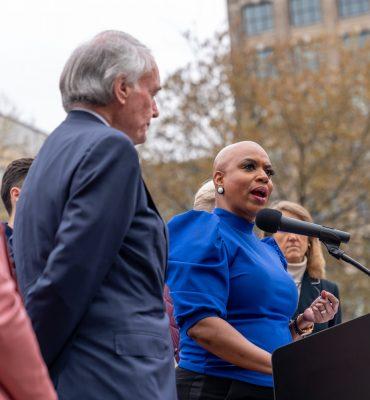
On April 19, Congresswoman Ayanna Pressley and Senator Edward Markey reintroduced their Ending Qualified Immunity Act, legislation aimed to eliminate the misconduct of government officials.
The bill was originally introduced in June 2020 by then-Congressman Justin Amash following the murder of George Floyd. It was introduced again to end qualified immunity, a court-invented doctrine that protects government officials against lawsuits that seek to make them personally liable for their actions.
“For too long, qualified immunity has prevented accountability and shielded those charged with enforcing the law from any consequences for breaking it,” Pressley said in a press release. “Our bill would restore necessary civil rights protections and is essential to providing the families of those abused by law enforcement with the healing they deserve.”
Traci Griffith, racial justice program director at American Civil Liberties Union in Massachusetts, said qualified immunity is “extremely problematic.”
“It gives officials the ability to commit egregious acts,” Griffith said. “It prohibits those who the egregious acts had been perpetrated against from being compensated for those egregious acts.”
While this law was passed by the United States Supreme Court in 1982 to protect government officials from civil prosecution, Griffith said today’s crimes are much different from then.
“We, yes, are concerned about crime, but we are also concerned about crimes that are being committed by those that are supposed to protect society,” Griffith said. “There’s much more scrutiny on officials and their wrongdoing than there was back in 1982.”
She also said ending qualified immunity would be “beneficial” for society.
“It will give the power back to citizens who may have been harmed by their government … qualified immunity inhibits that ability to do that,” Griffith said. “We want to make sure that the qualified immunity is not something that allows for elected officials to perpetrate wrongs against members of our society.”
Jacob Love, staff attorney at Lawyers for Civil Rights Boston, said getting rid of qualified immunity can have a “deterrent effect” on police.
“Police officers know in carrying out their duties that if they hurt someone … that they are not protected by the doctrine of qualified immunity and can face civil liability and lots of money damages that they would have to pay personally,” Love said.
He also said individuals are more likely to have more accountability in the court if qualified immunity is ended.
“It would make it easier for people who are the victims of police misconduct to win money damages for police officers in civil rights lawsuits, because those officers would not be able to raise the doctrine of qualified immunity as a defense,” Love said.
Lauren Bonds, the executive director of the National Police Accountability Project, said this bill could make police officers more conscious of their actions on the job.
“When qualified immunity was ended in New York City, the police unions sent out a memo to all their officers that said, ‘don’t search anybody unless you 100% know that it’s a constitutional thing to do,’” Bonds said. “It resulted in them exercising more care when they were conducting searches.”
She also said, since people of color and minorities are more likely to have their civil rights violated, passing the bill will benefit them the most.
Both Bonds and Love said they’re concerned about the difficulties of passing the Ending Qualified Immunity Act. But, Bonds said she remains optimistic the bill will pass.
“We think it’s absolutely critical for preserving people’s civil rights across the board, but particularly in terms of their interactions with police and prisons,” Bonds said. “Even though we don’t know if it’s going to pass, we really hope it does.”





















































































































